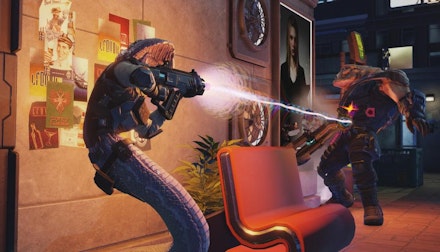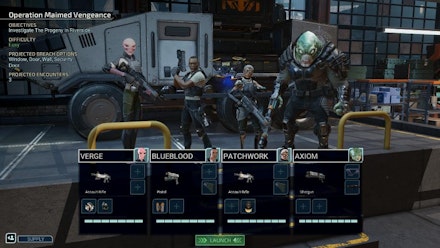War is over, give peace a chance – although that's perhaps easier said than done when the war in question was an alien invasion of Earth. Set five years after the events of XCOM 2, Chimera Squad sees a unified group of humans and aliens trying to keep the peace in City 31, an experimental metropolis trying to bridge the gap between species.
The shift in focus creates a unique feel for the series. There's a grittiness to the proceedings as you try to stem a wave of anarchy flooding City 31, which would tear down the fragile accord it has been built on. The stakes are more personal, with the eponymous squad fighting against terrorism and separatists rather than an intergalactic assault. Accordingly, the cast is more personal too – gone are the randomised grunts of the previous games, replaced with a defined cast of 11 distinct characters, each with unique personalities and abilities.

Verge, a Sectoid, specialises in psionics, allowing him to manipulate enemy movements, while human Godmother focuses on offensive shotgun skills. Or there's Torque, an alien Viper, who brings poison abilities to the team, while Zephyr, a hybrid, abandons weapons entirely, preferring brutal melee strikes to take out enemies. Each member brings something different to the game, and the banter between the teammates is a highlight both in and between missions. The focus on specific characters is going to be divisive with fans though, as it eliminates "permadeath" – here, if a squad mate is downed and can't be revived by a medic, you fail the mission and have to restart. Good for the developers in realising their narrative vision, bad for any players who want a more visceral sense of risk in combat.
More spin-off than sequel, Chimera Squad nevertheless manages to both refine and upgrade many of the hallmarks of the series. The already satisfying turn-based tactical combat of the prior XCOM games is still functionally the same – manoeuvre agents into position, taking advantage of cover, and unleash your own attacks – but now each party character's turn is interleaved with one from the opposing faction. This creates a more even flow to each battle, allowing you to adapt tactics on the fly, rather than issuing commands to your whole team and then potentially being steamrolled when the entire opposing faction moves. There's more to it than tit-for-tat attacks though, as certain abilities allow you to team up two of your party members, bumping up another's turn to strategically dominate tougher foes.
Chimera Squad manages to both refine and upgrade many of the hallmarks of the series.
Another fun new mechanic is breaching – at certain points of each mission, you'll have the option to arrange your squad at breach points, before storming into the next room. There'll usually be a tantalising trade-off to choose from – blasting through a wall may increase your surprise factor, but risking a frontal assault through the door may reward you with an attack bonus, for instance. Whichever you choose, you'll get a window of slow-motion assaults to try to take down an enemy or two, before your team slides into cover and the turn by turn tactics begin. Breaching adds a nice extra layer of consideration to each battle, while the room-by-room progression through each mission keeps things more focussed than in its predecessors.
The actual interface leaves something to be desired though. The abilities you select for each of your units aren't clearly highlighted in battle, while navigation of menus back at Chimera Squad's base – where you'll engage in research between missions, or train your agents – leaves much to be desired. Figuring out how to set a member into the active squad or how to set loadouts feels more like a stab in the dark than a well-designed process.

The aesthetics of the game feel confused too, part comic book-style illustrations, part 3D character models, with little rhyme or reason as to when one approach is used over the other for story events. Both visual approaches work well, so some consistency would have been nice – pick one and stick with it.
With its revisions of previous XCOM gameplay and the stealthy release model – less than two weeks between public announcement and launch – Chimera Squad feels like an experiment for developer Firaxis. Thankfully, it's an experiment that largely pays off, distilling the core experience into something even more engaging and establishing some very welcome precedents to carry into the surely inevitable XCOM 3.
